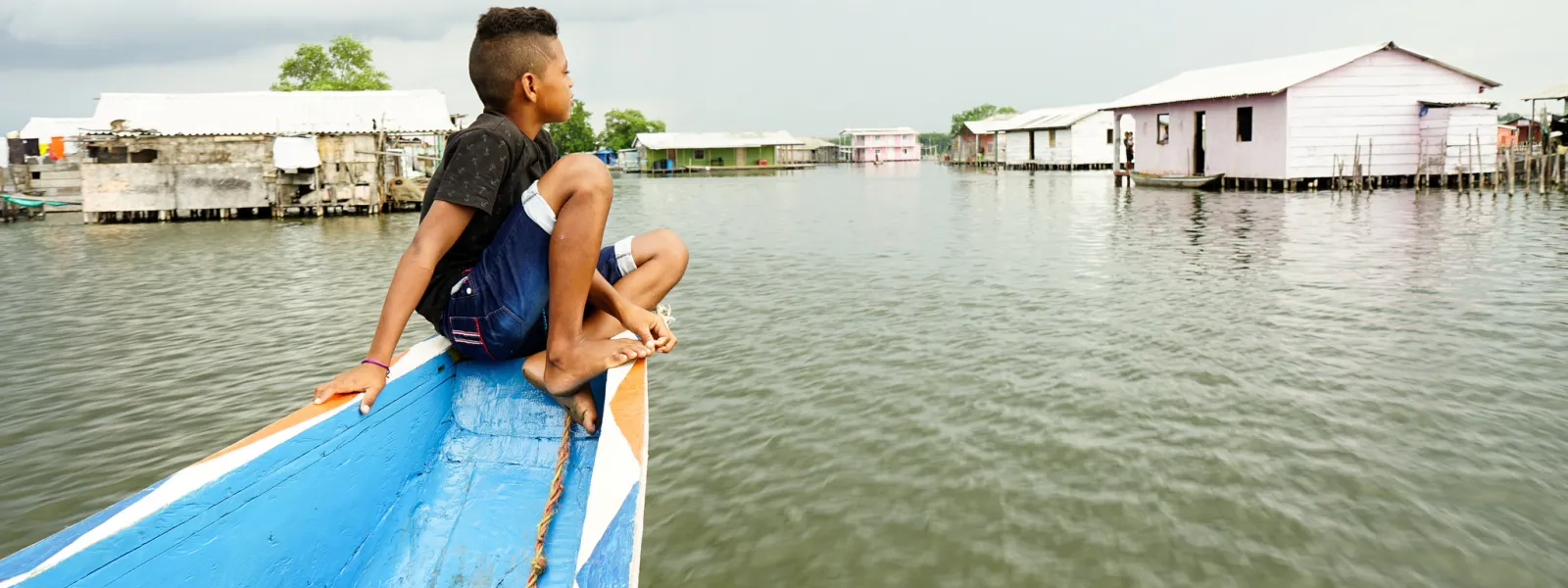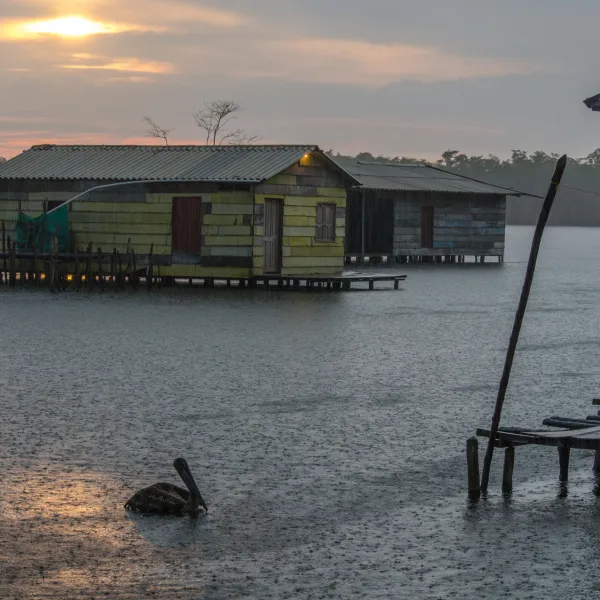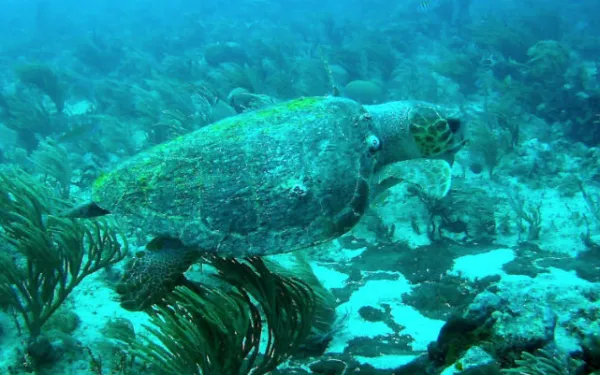
Project
Photo: Anna Laurie Miller / AIDAConserving the Ciénaga Grande de Santa Marta
Ciénaga Grande de Santa Marta, the largest and most productive coastal wetland in Colombia, covers 45,000 hectares. At the confluence of the Magdalena River and the Caribbean Sea, the site boasts an immense variety of flora and fauna, including mammals, birds and fish. Its southern tip is a beautiful sanctuary of mangroves, swamp and amphibious forest.
On the calm waters of the marsh stand the Ciénaga’s famous stilt villages, supported by pillars or simple wooden stakes and inhabited by local fishermen since 1800. In a place accessible only by water, many of the things we take for granted—being served a glass of water, quick access to a doctor—are considered luxuries. Residents depend on the natural world around them. Sadly, in recent years mass fish die-offs caused by the marsh’s degradation have threatened the livelihoods of 2,500 people who call the Ciénaga Grande home.
Illegal activities are destroying this vital ecosystem: intentionally set forest fires, deforestation of large tracks of land for agriculture and livestock, logging and burning of mangroves, and 27 kilometers of illegally built dikes.
This destruction not only devastates the local fishery; it also has global impact. Ciénaga Grande’s mangroves absorb large quantities of carbon dioxide from the atmosphere, aiding in the global fight against climate change.
The importance of the Ciénaga Grande has been recognized both nationally – the Sanctuary of Flora and Fauna Ciénaga Grande de Santa Marta is a national park – and internationally: UNESCO’s Man and the Biosphere program declared the lagoon a biosphere reserve; and the Ciénaga Grande is listed as a Wetland of International Importance under the Ramsar Convention, an intergovernmental treaty for the protection of wetlands.
AIDA and our partners are advocating for the Colombian government to fulfill its national and international obligations to protect the Ciénaga Grande. After all, millions of animals, the local community, and our global climate depend on it.
Partners:

Related projects
Belo Monte: Determined to achieve justice
By Flavia Amaral, AIDA attorney As construction of the world’s third-largest hydroelectric dam, Belo Monte, moves forward, social impacts and unrest continue. In the coming few months, close to 2,000 families are scheduled to be relocated from their homes in Altamira, on the Xingu River in Brazil, to newly built housing. Last year, another 2,000 families were resettled. The reconfiguring of the region continues to create social ills. The new settlements are far from downtown Altamira, and there is no public transportation. Many new houses are already showing structural problems, and there is little to no basic infrastructure such as health care centers, schools, and sewer treatment facilities. Also, as part of being relocated, a family must agree that they have no complaint or concern with the Belo Monte hydroelectric plant or the company responsible for the construction, a difficult ask for many who are giving up so much. For many indigenous communities, there is an explosion of illegal logging on their lands. Norte Energia,the consortium building Belo Monte, has not implemented required monitoring systems or constructed surveillance stations which would deter the logging. As a result, FUNAI, Brazil’s government agency that oversees Indian rights, reports that the situation is critical, and especially serious for the lands of the indigenous Arara people. Throughout the area, demonstrations continue by those who seek justice, recognition and compensation. Last month, hundreds of farmers held protests demanding land tenure, credit, and improvements to family farming. Two people died after being hit by a car that broke the blockade of protesters. This situation represents the unease, unrest, and violence that permeates the region. Clearly, the construction of Belo Monte has caused enormous impact in the Xingu River Basin – well before it’s operational phase. Four years ago, on the request of AIDA and partner organizations in Brazil, the Inter-American Commission on Human Rights took an important step forward for the people of the region. It requested that the Brazilian government adopt precautionary measures to prevent irreparable damage to the rights of indigenous communities whose cultural integrity and way of life were at risk from the construction of Belo Monte. Clearly, after all these years, these threats remain: Brazil has not honored the precautionary measures. AIDA will continue working until we ensure that the environment and the rights of communities in Brazil’s Xingú River Basin are fully respected. We believe that the Commission still has time to act, and that there is potential for the Brazilian government to reframe its policies and practices to become a global model for equity and justice. Thank you so much for your ongoing support of our work for the people and the environment of the Amazon!
Read more
Progress on Protecting the Loggerhead Turtle!
By Gladys Martínez Significant strides were taken last week toward the conservation of loggerhead sea turtles. A new international resolution intends to strengthen protections for this endangered species in the Americas, and outlines the primary threats facing loggerheads, including mining, all of which should be regulated to avoid harm. The resolution was approved during the 7th Conference of Parties to the Inter-American Convention for the Protection and Conservation of Sea Turtles (CIT), hosted last week in Mexico City. One of just seven species of sea turtle in the world, the loggerhead turtle is threatened by human activities such as unsustainable fishing, poorly planned development and extractive industries. AIDA was an actor and an observer in the conference, representing other organizations and individuals from civil society. My colleagues and I spoke with delegates and raised awareness of the harm that marine phosphate mining could cause to loggerheads, and to the ecosystem as a whole. We drew attention to the potential impacts of the Don Diego mining project in Bahia de Ulloa, Baja California Sur. The region’s first marine phosphate mine would, if executed, gravely impact populations of loggerhead turtles and other species that live in or migrate through Baja waters. I am pleased to report that I successfully advocated for the resolution to include mining on the list of threats to loggerheads. We also used our knowledge of international environmental law to help strengthen proposals within the resolution, and to make member States aware that immediate action is required for the conservation of the species. Details of the Loggerhead Resolution In the resolution, member States recognize that threats to the loggerhead turtle include development, coastal and deep-water fishing, marine debris, mining, pollution and climate change. The nations promise to work together to implement existing recovery plans for loggerhead populations, as well as to develop new plans in countries that still have not created them. They made the following commitments: Mexico and the United States will work together with Japan to develop a Trinational Recovery Plan for loggerhead turtles in the North Pacific. Chile, Ecuador, Peru and the United States will work with the Secretariat Pro Tempore of the Sea Turtle Convention and the Secretariat of the Convention on Migratory Species to implement a Species Action Plan for loggerhead turtles in the South Pacific. Mexico and the United States will continue working with collaborating countries of the North Atlantic to share information about the situation and tendencies of the loggerhead turtle of the Northeast Atlantic, and to identify collaborative conservation actions. A Report on the Conference Overall, I am quite satisfied with the advances achieved at this conference. I consider it a privilege to participate, and an honor to effectively contribute our knowledge and experience to conventions such as this, where decisions are made at an international level, and then taken back and implemented in each participating country. Another result of the Conference is the increased protection of the leatherback turtle (Dermochelys coriacea) of the Western Pacific. Member States approved a resolution in which they committed to: Deliver information annually to the Secretariat of the Convention on leatherback turtle bycatch taken by their fleets. Annually inform the Secretariat of measures that are being adopted to reduce bycatch. Identify, with the help of the Scientific Committee, critical areas and fisheries that require spatial and temporal management to reduce bycatch. Strengthen actions for the protection of leatherback turtles eggs. Establish and evaluate national programs for handling and releasing leatherback turtles taken as bycatch in fisheries. We trust that the States will transform these international commitments into effective actions for the conservation of sea turtles. At AIDA, we will remain vigilant to ensure these promises become reality.
Read moreEnvironmental organizations condemn attacks on the environment in Colombia
Bogota, Colombia. The undersigned environmental organizations condemn attacks on the environment made in the Colombian departments of Putumayo, Nariño, Arauca, Boyacá and Norte de Santander, which have been attributed to FARC-EP. According to media sources, attacks on oil infrastructure have caused environmental damage in the river basins of Tibú and Caunapí, among others, and in Bahia de Tumaco, affecting more than 84,000 people. These acts adversely impact local communities, the country and the environment on a global scale. Oil pollution in bodies of water seriously threatens the life and health of people, as well as the integrity of ecosystems and animal species. The undersigned organizations recall that international humanitarian law prohibits actors of armed conflict from engaging in environmental destruction unjustified by military needs, according to the principles of distinction and proportionality. Similarly, actors of armed conflict, when conducting hostilities, should refrain from undermining the human rights to water and a healthy environment. The organizations reaffirm that human rights and environmental law applicable in Colombia, as well as the government’s obligations in the field, are not suspended during periods of armed conflict. For all of these reasons, the undersigned environmental organizations call on FARC-EP to respect international humanitarian law and refrain from causing harm to the environment. They also reaffirm the necessity to exclude communities and ecosystems from armed conflict. Asociación Ambiente y Sociedad Asociación Interamericana para la Defensa del Ambiente (AIDA) Foro Nacional Ambiental Fundación Natura Klimaforum Latinoamérica Network (KLN) Red por la Justicia Ambiental en Colombia (RJAC)
Read more